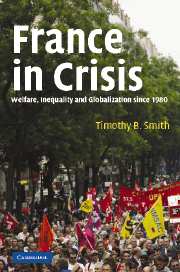Book contents
- Frontmatter
- Contents
- List of tables
- Preface
- 1 The misunderstood French welfare state
- 2 Corporatist welfare states: the residue of the past, or the wave of the future?
- 3 The “treason of the intellectuals”: globalization as the big excuse for France's economic and social problems
- 4 France's break with socialism
- 5 Persisting inequalities
- 6 The protected people
- 7 The excluded: immigrants, youth, women
- 8 The French exception
- Appendix: Some major pieces of social legislation, France 1893–2003
- Notes
- Index
5 - Persisting inequalities
Published online by Cambridge University Press: 12 January 2010
- Frontmatter
- Contents
- List of tables
- Preface
- 1 The misunderstood French welfare state
- 2 Corporatist welfare states: the residue of the past, or the wave of the future?
- 3 The “treason of the intellectuals”: globalization as the big excuse for France's economic and social problems
- 4 France's break with socialism
- 5 Persisting inequalities
- 6 The protected people
- 7 The excluded: immigrants, youth, women
- 8 The French exception
- Appendix: Some major pieces of social legislation, France 1893–2003
- Notes
- Index
Summary
[The income tax is] something anti-French, and contrary to the customs and genius of the nation.
Leading French newspaper, Le Temps, 1896.We must therefore conclude that, with the same [fiscal] means available to engage in redistribution as our neighbors – that is to say, a similar tax burden … and with a similar income distribution before taxes and a level of transfers without parallel, the redistributive results of France are inferior. This stems … above all from the limited nature of progressive income taxes.
The Conseil d'Analyse économique, reporting to Prime Minister Jospin, 1998.For several decades after the Second World War, many studies of the welfare state looked only at one side of the coin, at the apparently positive, “solidaristic” expenditures. They generally neglected to consider where the money used to pay for social programs came from in the first place. They also neglected to examine just who was receiving the bulk of social benefits. Was most “social spending” being devoted to the middle class? Were the poor and the working class paying more than they took out of the welfare state? Was income inequality reduced significantly? At the end of the day, was social mobility affected?
The late US economist, Mancur Olson, reminded us in his book The Rise and Decline of Nations (1982), that:
current orthodoxies of both Left and Right assume that almost all the redistribution of income that occurs is the redistribution inspired by egalitarian motives, and that goes from the nonpoor to the poor. In reality many, if not most, of the redistributions are inspired by entirely different motives, and most of them have arbitrary rather than egalitarian impacts on the distribution of income – more than a few redistribute income from lower to higher income people.
- Type
- Chapter
- Information
- France in CrisisWelfare, Inequality, and Globalization since 1980, pp. 127 - 148Publisher: Cambridge University PressPrint publication year: 2004

